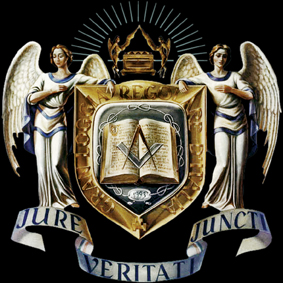A Short History of The Regular Grand Lodge of Italy
 |
A Short History of The Regular Grand Lodge of Italyby the R.W.Bro. Dino Arrigo AGM
1993 was the year when the Italian political and social system collapsed and even Freemasonry, at that time mainly represented by the Grande Oriente d’Italia, had not remained uninvolved in this unusual as much as virulent Italian revolution.In that moment of particular tension and necessity of new representatives, some authoritative brethren decided to dissociate from the lodges they belonged to and, joining together, they established the Regular Grand Lodge of Italy as the "sole, independent, undivided, responsible, autonomous and supreme authority over the whole territory of the Italian Republic for the governing of the degrees of the pure and antient universal Freemasonry". The new Grand Lodge had also identified its motto, which appeared inscribed inside the coat of arms: "iure veritati iuncti". Law and truth together. Thus the history of the Regular Grand Lodge of Italy began, under the auspices of this binding statement. A few days after, from the new Roman headquarters in via Flavia no. 72, the reasons of the establishment of the new Regular Grand Lodge of the Antient, Free and Accepted Freemasons of Italy were made public. "With the Regular Grand Lodge of Italy, for the first time in our country, begins the pure ancient Freemasonry, with the deep and justified belief that its principles have been definitively and irreparably violated, with the consequence that often Freemasons have acted on the basis of rules that nothing had to do with Freemasonry, in spite of that moral improvement that everyone has the duty to realize in the depths of his conscience. The truth is that when the fundamental principles that inspire practical behaviour degenerate, everything becomes possible. So the false perspectives, the deviations, the search of something that nothing has to do with Freemasonry originate. Instead, the project of a 'new Freemasonry' does not refer to a different Masonic doctrine, since everything in Freemasonry has already been written and nothing has to be invented, but this project is to know how to read the book of the authentic ancient Masonic tradition, having clear the sense of the return to the origins and from this constitutional choice come the obligations that morally bind all its members. However, going back to the origins is meant by the Regular Grand Lodge of Italy as being inspired by the Anglo-Saxon model of Freemasonry that from the beginning of the eighteenth century has spread around the world." |
|
 |
||
|
The courageous choice of the Regular Grand Lodge of Italy found immediate consents not only among the Freemasonry members but also among the civil society in which many people, careless about what was observed in the past on the Italian Freemasonry, asked to be admitted to the new Institution in order to share its ideals. The new position of the Regular Grand Lodge of Italy was also awarded at both European and international level as evidenced by the continuous growing flow of "recognitions" of the new Italian Masonic reality. The United Grand Lodge of England "mother" of worldwide Freemasonry, on the occasion of the quarterly statement of December 8th 1993, gave its much-desired recognition, taking it away from the Grande Oriente d'Italia. The decision of the ancient English group was followed, a short time later, also by the National Grand Lodge of France, by the Grand Lodge of Ireland and by the Grand Lodge of Scotland. Then the Grand Lodge of Israel and the Grand Lodge of Turkey sided with the new Italian Regular Grand Lodge. Then it was the time of the Grand Orient of Brazil, of the Grand Lodge of Cameroon, of the Grand Lodge of Burkina Faso, of the Grand Lodge of Benin, of the Grand Lodge of the Ivory Coast, of the Grand Lodge of Senegal, of the Grand Lodge of Togo and of other Grand Lodges. Iure veritati iuncti.
|
